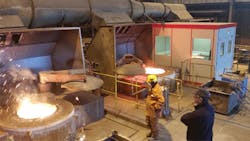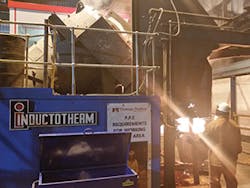Thomas Dudley is a gray and ductile iron foundry near Birmingham, England, one that has demonstrated significant growth in the past six years, with order volumes and revenue increasing steadily. Progress has put a strain on production however, in particular on the melting capacity of the foundry’s two electric induction furnaces. So, foundry division director Mick Cramphorn placed a call, and made a seemingly impossible request of furnace builders at Inductotherm Europe Ltd.: “Install and commission new melting capabilities in just one week.”
Inductotherm Europe Ltd. is part of the Inductotherm Group, and designs and builds induction melting installations ranging from small vessels for precious metals to medium-volume and larger operations for nonferrous, iron, and steel alloys, as necessary. All the equipment is manufactured at Inductotherm workshops in Droitwich, England.
Cramphorn detailed how the furnace replacement project developed over the past six years of Thomas Dudley foundry division’s expansion: “Since 2009, we have proactively doubled our turnover with 60% of the people, generating profit to support further investment. Despite this phenomenal turnaround, the two major constraints going forward were that we did not have enough molten metal capacity or talent in depth.”
With Inductotherm equipment already in operation at the foundry for 28 years, Cramphorn and his team looked to the induction-melting technology source to chart the next phase of its development, and ensure that future demand would be met.
“The three existing furnaces from Inductotherm were very reliable and there was nothing wrong with them,” he emphasized. “They had been well maintained and serviced but they were only giving us 4 metric tons/hour and our plan was to expand to 6 metric tons/hour. The problem was that we are growing at such a rate that we just could not afford to lose any planned production days, so whatever we did had to take place during our autumn (2014) shutdown period.”
Working with the supplier, Thomas Dudley opted to increase the existing, 2,500-kW Power-Trak® single-output induction power source to a 3.5-MW Dual-Trak® system, and integrate that new power supply with the existing 4-mt/hr. furnaces. The installation also would include a new transformer, cooling, hydraulic, and control systems.
The whole project involved moving existing equipment to perform as the backup and excavating the melting area, as an additional 10 to 12 feet of space was needed to accommodate the larger equipment. The control room is below floor level, so much of the work was undertaken by several contractors in a confined space.
The time frame quoted was six weeks, but the time frame Thomas Dudley required was eight days.
“Quite frankly, on paper it seemed impossible; Mick even called it ‘mission impossible’,” recalled Craig Holdback, area sales manager at Inductotherm Europe. “But the thing is, once we were on site and everyone was working together I never once doubted that we could do it. We all worked around the clock, and the Thomas Dudley employees were amazing. It couldn’t have happened if they hadn’t integrated well with Inductotherm and Emsco (an affiliated furnace building company) engineers who worked a 24-hr shift pattern.
“The team at Thomas Dudley were some of the best we have worked with,” he added. “They had a passion not to let their customers down and it is a credit to all involved that the team truly respects its values of safety first, customer focus and continuous improvement.”
The only realistic way to achieve the requested schedule for installation and commissioning during the one-week autumn shutdown was to pull four to five weeks from the project. Thomas Dudley had to undertake a huge civil engineering project earlier in the year while the foundry was still in full production by expanding into the existing scrap bay, to acquire the extra space needed for the revamped operation. They built new, oak-lined scrap bays, replaced flooring to accommodate charging cars, and installed water cooling and pipework.
Inductotherm worked with Thomas Dudley to ensure everything was in place for the October shutdown deadline. “We undertook the project in phases,” said Craig Holdback. “On June 16 the radiator was delivered and we had to crane that in over the roof of the foundry. In July the rectifier/invertor panels of Dual-Trak were delivered with pump set hydraulics, etc., to enable much of the piping and wiring to be done.
“In September we installed the transformer, so more wiring could be carried out,” he continued. “Then came the October shutdown week, which we had all been working toward.
“The foundry closed on Thursday night and we had to wait several hours for the furnaces to cool down before we started work at 6 a.m. on the Friday morning,” Holdback recalled. “The existing, holding VIP was removed and the existing 2,500-kW VIP was repositioned and installed to run one 4-mt furnace. Then, the new 3500-kW Dual-Trak was installed and commissioned. The metal was being poured a week later, on November 2. It really was a testament to teamwork and dedication from all concerned.”
The project has brought a measure of pride to everyone involved, as well as a melting capacity expansion for a well established foundry — allowing it to satisfy growing demand. “There’s no other way of putting it but that this was a massive exercise and we didn’t lose any production time or hurt anyone,” according to Cramphorn. “Inductotherm, Emsco, and the Thomas Dudley team were great. It is a testament to great planning and great people.”
Cramphorn added that he was confident of the project’s success from the first day. “We were given the commitment to the project from right at the very top of the Inductotherm Europe organization, and I have to say the superb project management and the skill level of all parties to accomplish this in a one-week shutdown is tremendous. Everyone just knew what they were doing and what was expected.”
The two constraining factors for the foundry’s future melting ambitions were that the existing melting bay wasn’t large enough and the power on site wasn’t sufficient. A higher than expected quotation from the existing electricity supplier to install more power on site has meant the foundry revised original plans but Inductotherm has designed a scalable system to allow Thomas Dudley to continue to expand.
“If we buy the power in the future we can install another Dual-Trak,” Cramphorn said. “You have to remember that 20% of our downtime was caused by waiting for metal – this is virtually eradicated now. We are now getting around 5.6 to 5.8 mt/hr. out of the new plant and are working an extended day shift. Metal is still our biggest issue, but now we are equipped to pursue the market opportunities as we continue to expand.”

